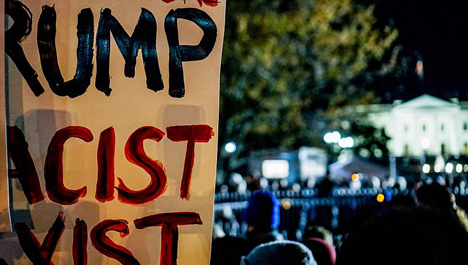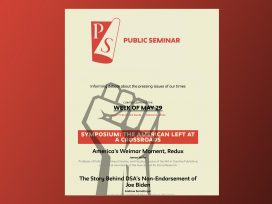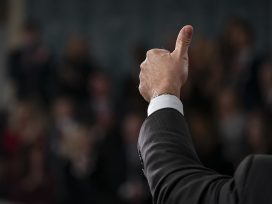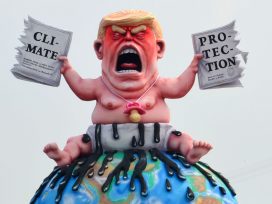The day after the election, Clinton supporters were in mourning. How could such a thing have happened? Why had this plague been visited on us? Callers to talk-radio programs fretted over what to tell their children, and talk-show hosts encouraged their listeners to express their shock and grief. Trump supporters were urged to reassure the world that all they wanted was unity, not continued hostility. On Facebook, words like “nightmare,” “earthquake” and “apocalypse” appeared with breathless regularity.

Photo: Ted Eytan, 2016.11.12; source Wikimedia
Maybe they shouldn’t have been quite so surprised. If they’d looked beyond the country’s borders, they’d have seen something so obvious that it hardly bears repetition: Trump’s success was not an isolated phenomenon. The same tide that swept him in, and many of the same concerns that he raised – fear of immigrants, working-class impotence – had been manifest in European right-wing parties for decades, and in the last few years had even created a swath of new parties.
There was a certain naiveté in the American Liberal Left, and perhaps a “siloing” effect due to limiting their news sources to those that confirmed what they already thought. By the end of the day, some of my FB “friends” were talking about living in a “bubble,” and vowed in the future to take a step out of their comfort zones.
We didn’t even have to look to Europe; the primaries were enough. Trump’s success in defeating 16 other Republican candidates, many of whom were in the inner circle of the party, made it clear to anyone who was willing to see that a contingent on the Right wanted change at any cost, and was willing to bring down the system with it. The Sanders movement and its summary dismissal by the power-brokers of the Democrats showed that discontent wasn’t limited to the Right. Waiting in the shadows on the Left was a patchwork of groups representing ethnic and sexual minorities, as well as old and new Leftists who felt that the Democratic Party had drifted away from its egalitarian roots.
If Clinton didn’t hurry up and try to win over these factions, her numbers might not add up.
She didn’t, and they didn’t. Her campaign was cautious and inconsistent. At times she used tired slogans to appeal to voters’ higher instincts and motives; at others she aired dirty laundry from Trump’s soiled past. It’s debatable whether the eleventh-hour statement by FBI Director Comey that his agency might further investigate her emails was the blow that put her out of contention. But what we learned recently was that Bill Clinton had been begging her for months to get out and campaign among the Rust Belt working-class voters whom she’d all but abandoned. The New York Times used the word “despondent” to describe ex-President Clinton’s frustration with his wife’s campaign manager, who ignored him completely.
As much as they favored Clinton, the mainstream media were of little help. In addition to giving Trump billions of dollars of free publicity, they never took him seriously, preferring to depict him and his supporters as buffoons. Only half the country’s eligible voters showed up at the polls, and a disproportionate percentage in key states neglected to vote for Clinton.
In hindsight, Clinton’s defeat has to be seen, at least in part, as the result of willful ignorance – a refusal to see that however vague the wish for “change” was, it had to be met with more than Establishment platitudes.
There were many reasons that the working-class turned to Trump. Most have been combed over in painful detail by the mainstream media, which have spent much of the past few days flagellating themselves for their shortsightedness.
One reason that deserves more attention was cited on election morning by the Conservative TV commentator Hugh Hewitt. He thought that the Affordable Care Act (“Obamacare”) itself was at the center of working-class discontent.
To recap: Both the Clintons and Obama failed to get through Congress a single-payer health care act. In Obamacare, private insurance companies rather than the government set the cost of insurance premiums. Although the government pays subsidies to many subscribers to defray costs, 20 per cent pay the full amount. Voters I talked to in New York, Pennsylvania and Ohio all complained about the high cost of health insurance premiums, some claiming that it cost their families over 10,000 dollars a year. Shortly before the election, many insurance companies announced that they were opting out of the system, which would drive the premiums even higher.
The fact is that the US has always had a de facto health care system: hospital emergency rooms. Any evening in an emergency room in a public hospital in any American city will be filled with poor people, ranging from some sniffling with colds to others holding their broken arms. Insurance or not, American hospitals treat everyone for free – or, rather, treat them and then send them home with huge bills that they don’t pay. This slapdash system costs the taxpayer more than a federal healthcare system would, but Congress doesn’t listen to accountants.
Tax payers do. To lower-middle class citizens already living on the edge, relying on free emergency rooms looked better than shelling out thousands of dollars each year for health care. Obamacare, at least in the form that many found punitive, had to go.
So the monster won. The bogeyman was elected. The amateur waged a smarter campaign than the old pro.
It seems futile to try to guess who the President-elect really “is”; part of his occasional charm, or at least his effectiveness, is that he doesn’t seem to worry about who he is or his effect on other people – whatever comes out of his mouth is OK with him. Eastern European friends who know a thing or two about demagogues insist that they’ve seen his kind before: I’m not sure.
At this time the only useful question to ask, it seems to me, is this: out of the hundreds of ideas that Trump floated and promises that he made daily, which will he pursue? More important, which are likely to be implemented?
Here is a very partial grouping of Trump’s proposals in the form of what the media like to call a “listicle”:
The first group is comprised of some of his more flamboyant plans. From the outset we can say that they are unfeasible, and that most of his supporters already know and accept this. Among these are putting up a Great Wall of America (“What if private owners don’t want to sell the land under the Wall?”), rounding up 11 million illegal immigrants (“Who’s going to do the rounding-up?”), unilaterally scrapping the seven-nation Iran Nuclear Plan (“What would the other co-signers do?”).
Other proposals belong more in the Democratic playbook than the Republican. Spending billions on decaying national infrastructure, federal funding of maternity leave for working mothers – these sound more like Roosevelt than Reagan, though it should be noted that neither Trump nor Clinton (who shared these ideas) were clear about how to pay for them.
A third group of proposals is so vague and difficult to implement that they might as well be pipe dreams. These include “bombing the hell out of ISIS,” “getting out of the Middle East,” closing the country’s borders to Muslims, bringing back jobs that technology made obsolete – you name it, Trump has said it. Before being frightened out of one’s wits by some of the ideas, however, it helps to consider if they could actually be put into action.
The final group is both feasible and ominous. Among these are the potential appointment of two or three conservative Supreme Court Justices, attacking Obamacare if not dismantling it outright, cutting taxes and all sorts of federal programs, tightening up immigration, reversing the liberalization of American-Cuban relations, overturning the progress that Obama made in limiting carbon and greenhouse gas emissions. This last area seems to be the most immediately vulnerable, and the one that Trump will go after first.
And in which category should we put potential trade wars with Japan and China? Hard to say, though even talking about them makes international markets nervous.
The biggest issue on Trump’s agenda is, of course, the one that got him elected – how to put the large number of people who used to gain their livelihood with their hands back to work. Other than threatening to penalize companies for moving jobs offshore, Trump hasn’t offered solutions, but again, his supporters seem to be patient. To his supporters, the fact that he’s a businessman rather than a policy wonk – not a self-made businessman, nor exactly an honest or brilliant businessman either, a self-promoter more than an empire-builder – seems to be enough to indicate that eventually he may come up with some ideas.
When you think about it, in electing Trump they settled for very little, which more than anything else shows how despairing they must feel.
In this first week after the election, the media have already said that they’ve seen the emergence of a new Donald Trump. They used words like “gracious” and “humble” to describe the behavior of this strange animal. The transition team that he assembled and some on the list of potential nominees to cabinet posts suggest that he may turn out to be more of a traditional Establishment Republican than either his supporters or his opponents expected.
But Clinton supporters are justifiably suspicious. Where happened to the inflammatory Donald? The vengeful, insulting, foul-mouthed, misogynistic, racist, narcissistic Donald? The rabble-rouser who excited his supporters not only with inflated fantasies about Clinton’s sins but a grand plan of Fortress America, the most powerful nation in the global arena and a long-lost Paradise of full employment and prosperity at home?
There is reason to be concerned. Though in his victory speech Trump stated the usual cliché about wanting to be “a President for all the people,” he’s made no gesture to reach out to any of the groups that he insulted. There have been many reports about attacks on Muslims and African-Americans. In the streets, demonstrations against Trump’s Presidency have taken place in at least ten cities, with many more demonstrations planned.
The minute that he becomes President, Trump will face a terrible dilemma. If he comes to his senses and recognizes that his more extreme ideas are unrealistic, his change of heart is likely to ignite the fierce anger that the radical fringe of his supporters on the Right are itching to express.
But if the rabble-rousing Trump wins the day and chooses to act on those proposals, the consequences will be even worse. There is a budding coalition of young environmentalists, activists from Black Lives Matter, Bernie Sanders enthusiasts and idealists tossed away by Establishment Democrats, all of whom are no doubt girding themselves for the street war that they may suspect is coming.







